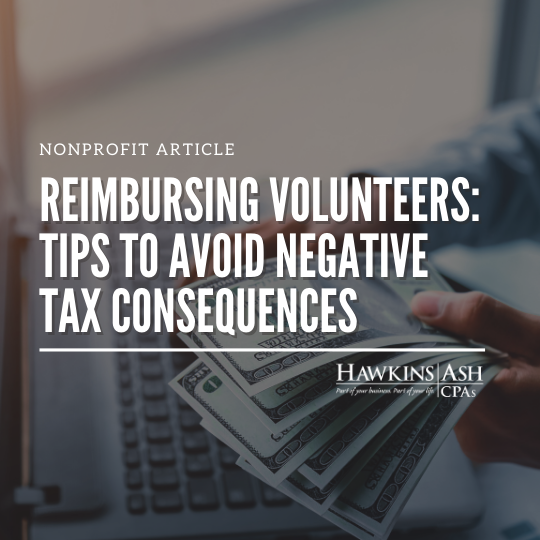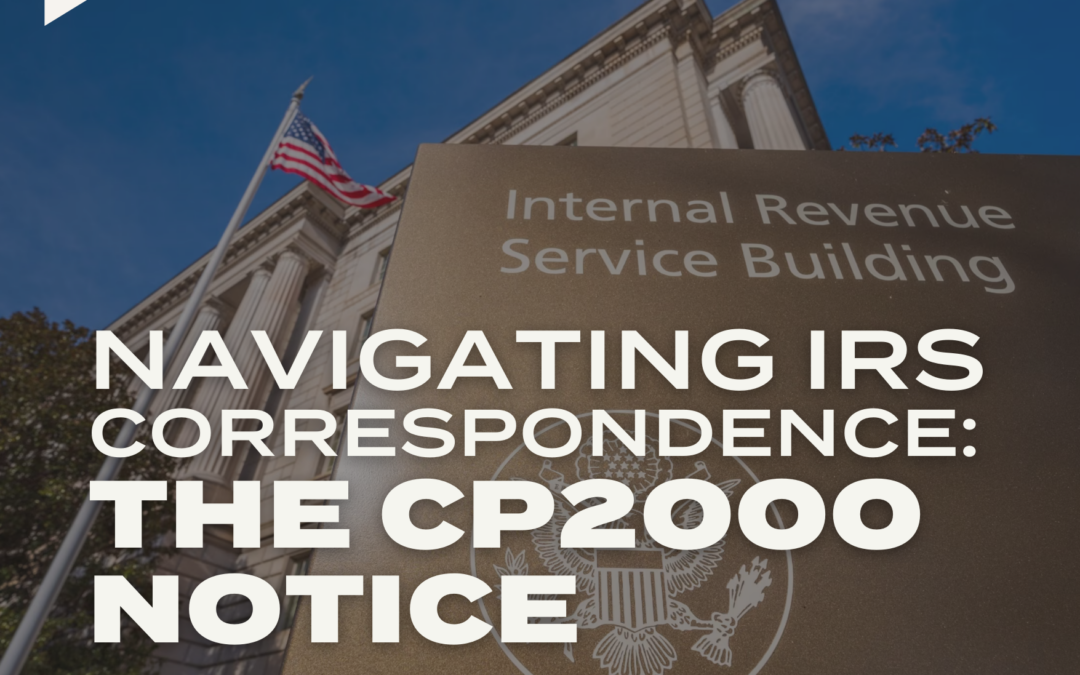Many nonprofit organizations rely on volunteers who provide many hours of valuable service to help the organization achieve its mission. Sometimes volunteers have out-of-pocket expenses while performing volunteer work. If the nonprofit reimburses the volunteer for those expenses, it will result in taxable compensation, unless the reimbursement is made pursuant to an accountable plan.
An accountable plan is a reimbursement or other expense allowance arrangement (plan) that requires a volunteer receipt to substantiate covered expenses and return any unsubstantiated advances. Per IRS Treasury Regulation 1.62-2(c), there are three basic rules that must be met for the plan to be accountable.
These rules are generally applied on a recipient-by-recipient basis.
- The plan should only pay reimbursements and allowances for reasonable expenses that have a business connection. The volunteer must have paid or incurred deductible expenses while performing services for the nonprofit related to its exempt purpose. Examples of expenses include, but are not limited to, lodging and meal expenses while away from home overnight for nonprofit business and mileage reimbursed for the volunteer using his or her personal automobile for nonprofit related travel. Please note that per IRC Section 170 (i), the mileage reimbursement rate is $0.14/mile for volunteers. Any excess amount “reimbursed” to a volunteer that is not considered a common law employee is compensation reported on Form 1099-MISC.
- The volunteer must provide adequate substantiation for the expenses being reimbursed within a reasonable period of time. Substantiation can include completing an expense reimbursement form or submitting a detailed written record detailing the expense amount, when and where incurred, and relationship of the nonprofit organization’s activities. Supporting documents can be original receipts or copies. Please note electronic documentation is also permitted. The nonprofit should exercise control over amounts paid to ensure only ordinary and necessary business expenses are paid.
- If expense advances or allowances are paid to a volunteer, any excess advances that exceed substantiated expenses must be returned by the volunteer to the nonprofit organization within a reasonable period of time.
Reasonable period of time is mentioned a few times in Regulation 1.62-2(c).
So what is a reasonable period of time? The definition of reasonable period of time depends on the facts and circumstances of your situation. However, regardless of the facts and circumstances of your situation, actions that take place within the time specified in the following list are treated as taking place within a reasonable period of time:
- Volunteers receive an advance within 30 days of the time they have an expense.
- Volunteers adequately account for their expenses within 60 days after these expenses were paid or incurred.
- Volunteers return any excess reimbursement within 120 days after the expense was paid or incurred.
- Volunteers are given a periodic statement from the nonprofit organization (at least quarterly) that asks them to either return or adequately account for outstanding balances and that they comply within 120 days of the statement.
If the rules for an accountable plan aren’t followed as discussed above, reimbursements, advances, or allowances must be treated as employee compensation to the volunteer. This is reported on a Form W-2, and the “reimbursement” is subject to Federal income tax withholding and FICA taxes just like any other form of compensation. This results in taxable income to the volunteer and additional FICA taxes to the nonprofit organization. As a nonprofit, it is important to review your accountable plan to make sure it is in compliance for both volunteers and employees.
Volunteers can claim a charitable deduction for their unreimbursed out-of-pocket expenses incurred in providing services to an IRC Section 501(c)(3) organization. These expenses require substantiation similar to the substantiation rules if the volunteer donated money to the organization.
Substantiation requires the donor or volunteer to produce one of the following:
- A canceled check.
- A receipt showing the donee’s name, contribution date, and contribution amount (or a letter or other communication from the donee).
- Other reliable written records if neither (1) or (2) are available.
Unreimbursed expenses of $250 or more must be supported by a contemporaneous written acknowledgment from the donee, in addition to meeting one of the three previous recordkeeping requirements. Organizations should remind their volunteers of the opportunity to deduct their out-of-pocket expenses and be diligent in providing the documentation required to support the volunteer’s deduction.
Another item that nonprofits should be aware of is the excess benefit and disqualified persons (DP) rule. An excess benefit is generally defined as the amount by which the economic benefit received by a DP exceeds the value of the consideration given by the DP. Disqualified persons include voting directors, certain key officers, and other employees who have substantial influence over the affairs of the organization. If a DP receives an excess benefit, he or she is subject to a 25% excise tax on the excess amount.
If you would like more information on accountable plans or any of the other topics discussed here, please contact us.





